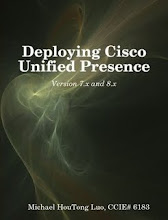GNS3 is almost perfect except for performance. With a couple routers turned on, GNS3 is pegging about 90% of the CPU. So I look for alternatives.
IOU (IOS on Unix) is a Cisco-Internal-Only tool that emulate IOS devices. It has quite a few drawbacks:
- Cisco Internal Only
- Has to run proprietary IOS
- Not user friendly - You'll have to build your network topology from a text editor instead of drag-and-drop. You'll have to do a lot of thing from Unix/Linux command line.
Drawback #1 and #2 are no longer problems in the era of Google. For #3, Andrea Dainese built "IOU Web" - a web interface to manage labs on IOU.
Just think of IOU as a back end process running on Linux. 'IOU Web' is the front end interface. Like "CallManager Service" is the back end and "CCMAdmin web" is the front end.
One other thing I like about IOU Web is - you may make your own 'clickable' network diagrams. You make your own network diagram, save it as jpg, make the routers/switches clickable. When you click on a router on the drawing, it'll open up a telnet session to that router.
You may also copy the lab content (in rich format) and paste it into the 'Description' tab. Then edit it the way you like. Very convenient on building your home lab (and carry it anywhere you go).









